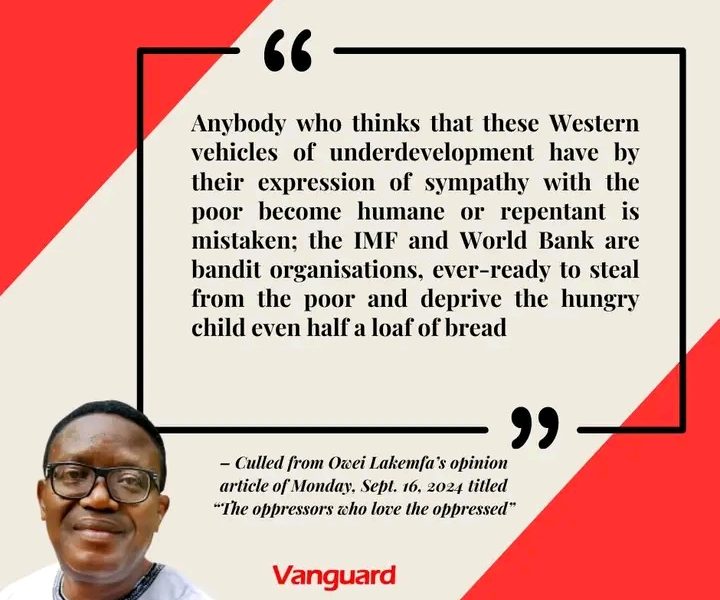Opinion
THE OPPRESSORS WHO LOVE THE OPPRESSED
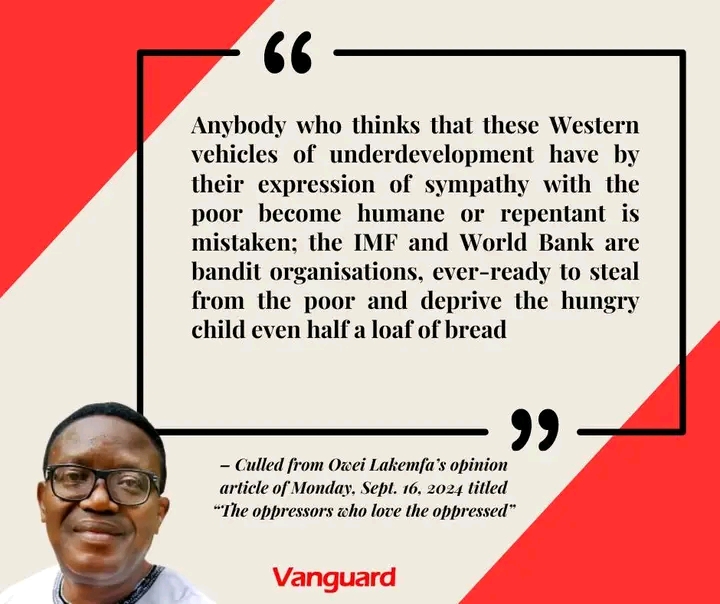
THE OPPRESSORS WHO LOVE THE OPPRESSED
By Owei Lakemfa
IT is bizarre. The International Monetary Fund, IMF, calling on the government to protect the poor from the impact of the fuel price hikes it engineers! To add to its criminal thought process against the Nigerian people, the same IMF is telling the Tinubu administration that fuel prices in Nigeria are too low and need to be increased because it is allegedly selling below market price. What market?
To understand this, we need to know that the Western Europe-owned IMF and its Siamese American twin, the World Bank, have since 1981 told every successive Nigerian government that our petroleum product prices are too cheap and must be increased. Based on their ‘advice’, every successive Nigerian government increases the price of petrol. The more government increases the price, the more impoverished Nigerians become to the extent that even as an oil-endowed and oil-rich country, Nigeria became the poverty capital of the world. Yet, the West imposes ever more pressure that the price be increased.
Let me give you an idea of the depths the IMF and World Bank have pushed us. When this shoving of Nigerian governments started under the Shagari administration, a litre of fuel was raised from 15.3 Kobo to 20 Kobo. Then as part of so-called reforms and the ruinous Structural Adjustment Programme, SAP, the Babangida regime first moved the price on March 31, 1986 to 39.5K, then, two years later to 42K , on to 60K, and finally, 70K.
The illegal Shonekan interim regime moved it to N5, Abacha reduced it two weeks later to N3.25 before moving it to N15 and two days later reducing it to N11. The Abubakar regime took it to N25 before reducing it 17 days later to N20. Obasanjo in a series of increases took it to N70 and Buhari took it to N238 before handing over to Tinubu on May 29, 2023. In the last 15 months, President Tinubu has increased the price, first to N545.883, then to N617, and now to N897.
The goals of the IMF and World Bank are to dominate the world on behalf of the West, discourage production by the underdeveloped countries and ensure they remain providers of raw materials. Part of their strategy is to bury client states in unnecessary and doubtful debts and, reduce them to junk status.
Anybody who thinks that these Western vehicles of underdevelopment have by their expression of sympathy with the poor become humane or repentant is mistaken. The IMF and World Bank are bandit organisations, ever-ready to steal from the poor and deprive the hungry child even half a loaf of bread.
They are undertakers of the West who dig the graves of the poor and underdeveloped countries and bury their hopes and, possibly, their future. So, if they express sympathy with the plight of their victims, it is not skin-deep. It is like a person carrying out cosmetic surgery, that in itself neither changes the age, nor the person.
In the midst of mass misery, deprivation, hunger and anger, the narration is being pushed that our political elites admire China and would want Nigeria to develop like the Chinese. Yet, they would not take the basic steps towards development the children of Chairman Mao Tse Tung and Chui Enlai have taken. Not even to start with the most basic step, which is to develop a thought process.
The basic principle of China is that the business of the Chinese government is business; in contrast, the Nigerian government says it has no business in business. So, how can the Chinese reforms be its model? In China, there is crime and punishment as indeed should be in any sane clime. In Nigeria, there is crime, but punishment depends on social status. As the ruling All Progressive Congress, APC, had often told its opponents, come over and join us, and all your sins (crimes) are forgiven. Indeed, it is easier for the camel to pass through the eye of a needle than for a politically-connected Nigerian elite to be successfully tried in court. Even if by happenstance he were found guilty, there is a guarantee that he would not spend his full prison term behind bars.
So, when government claimed that the Nigeria Labour Congress, NLC, President Joe Ajaero was detained last week on his way to the United Kingdom because nobody is above the law, I am not sure anybody believed it. The issue of Ajaero is not about law, it is about lack of coordination in government and little veiled incompetence amongst the security services. How come almost every arm of the security services are inviting or arresting the same person for a sundry of known and unknown reasons?
The labour leader has been arrested, and even beaten by a state government and, multiple arms of the police and the secret services. I will not be surprised if local traffic wardens like LASMA arrest him to ‘assist with investigations’. So the issue about Nigerians like Ajaero and the youths on treason trial for publicly demonstrating their feelings, is not about Nigeria being a country of laws, but about social justice.
This, again, raises our claims to want the Chinese model of reforms. Unlike Nigeria where the law is supposed to be even-handed for every citizen, in China, the higher you are in public office, the higher your punishment. A crime in China, say for theft of public funds which would earn a lowly citizen years imprisonment, would fetch a highly placed public official the death penalty. Let me also say that from my observation of the Chinese legal system, punishment for crimes are carried out.
It is the failure to bring crooks to justice that has saddled Nigeria with lots of baggage that would not allow the democratic system breathe. For instance, our elections are a litany of crimes for which the perpetrators, including hired thugs, are richly rewarded. That is why certified street thugs in various parts of the country are multi-billionaires.
I feel ashamed as a Nigerian that each time elections are to be held, especially at national and state levels, former leaders, serving and past governors, senators, religious leaders, academics and security chiefs gather to sign peace accords with a promise not to rig elections or perpetrate violence. As it turns out, these agreements are not worth the paper on which they are written.
After such agreements, the peacemakers -I wonder who picks their bills – retire to their homes, and the gladiators in the elections do what they know best.
We can learn lessons on development but we will be deceiving ourselves if we think oppressors will fall in love with the oppressed. You can take this to the bank, including the World Bank.
Source: vanguard news
Opinion
“Delta: Worst in Educational Institutions Distribution” – Mulade Declares as He Calls for Ijaw Inclusion
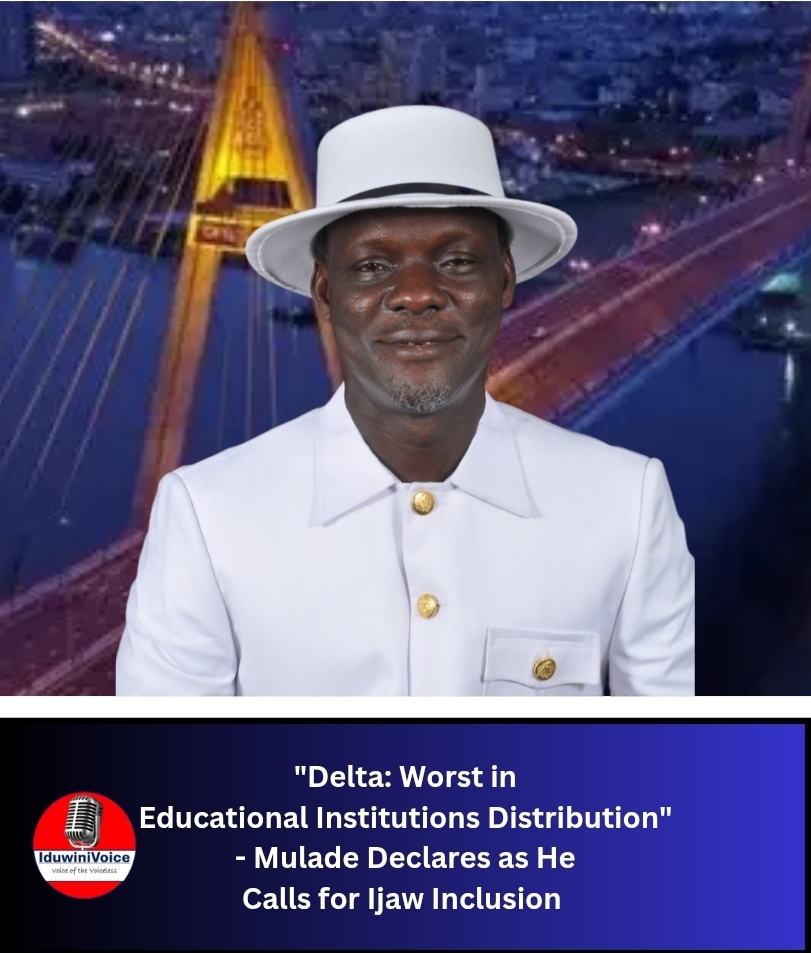
By: Favour Bibaikefie
A development Ijaw leader and development advocate, Comrade Mulade Sheriff, PhD, has accused the Delta State Government of systematic marginalisation and deliberate neglect of Ijaw communities, particularly in the area of educational development and institutional presence.
Mulade, who described the situation as “unjust, provocative and unacceptable in a democratic society,” said the continued exclusion of Ijaw areas from the siting of state-owned educational institutions represents a clear case of structural discrimination, despite the region’s enormous contribution to the economic survival of Delta State.
Dr. Mulade, “It is painful and unacceptable that a people whose land produces greater portion of wealth sustaining this state are treated as second-class citizens when it comes to development especially in the area of higher educational institutions. This is not only unfair; it is dangerous for the unity and future of Delta State.”
The Ijaw-born activist listed the existing state-owned tertiary institutions in Delta State and pointed out that almost all are concentrated outside Ijaw territories, reinforcing a long-standing pattern of exclusion as regards State-Owned Universities such as:
– Delta State University, Abraka;
– Southern Delta State University of Science and Technology, Ozoro; Southern Delta University of Science and Technology, Orerokpe Campus;
– Dennis Osadebay University, Asaba;
– University of Delta, Agbor;
– State-Owned Colleges of Education and Health Institutions:
– Federal College of Education (Technical), Asaba;
– College of Education, Edjeba Road, Warri;
– Delta State College of Physical Education, Mosogar;
– School of Midwifery, Asaba;
– State School of Nursing, Edjeba, Warri;
– College of Nursing Science, Sapele;
– Delta State-Owned Polytechnic Institutions:
– Delta State Polytechnic, Ogwashi-Uku;
– Delta State Polytechnic, Otefe-Oghara;
– Delta State Maritime Polytechnic, Burutu; (with the poorest infrastructure and lacks).
Mulade stressed that out of all these institutions, only one, the Delta State School of Marine Technology, Burutu is located in Ijaw land, a reality he described as “appalling, insulting and indefensible.”
“One institution for an entire ethnic nationality that contributes massively to Delta State’s oil wealth is not just marginalisation; it is a deliberate policy of neglect,” he declared.
The rights activists further lamented that while Ijaw communities bear the environmental burden of oil exploration including polluted rivers, destroyed farmlands and health risks, they are consistently denied the benefits of development, especially in education.
“Our youths are denied opportunities not because they lack potential, but because the government has refused to bring development to our doorsteps. This imbalance is breeding frustration, and must be corrected urgently,” Mulade warned.
The Ibe-Sorimowei of the ancient and oil-rich Gbaramatu Kingdom in Delta State, Chief Mulade Sheriff strongly appealed and called on Governor Sheriff Oborevwori to rise above politics, sentiment and take deliberate steps to correct the imbalance by prioritising the siting of new educational institutions in Ijaw areas, upgrading existing infrastructure and appoint qualified Ijaw sons and daughters as Vice-Chancellor and other principal officers in Delta educational architecture as compensation now.
“Governor Oborevwori must show that he is a governor for all Deltans, not for a select few. The Ijaw people deserve fairness, inclusion and respect. Educational development is not a favour; it is our right,” he stated.
He warned that continued neglect of Ijaw areas could deepen feelings of alienation and undermine the sense of belonging among the people.
Demand for Equity and Justice
Mulade concluded by calling on civil society groups, traditional rulers, youth organisations and stakeholders across Delta State to speak out against structural injustice and demand a more equitable distribution of development.
“This is not just an Ijaw issue; it is a justice issue. A state cannot develop sustainably when a significant part of its population is consistently excluded,” he said.
Opinion
Ijaw Nation Is Watching Delta State 2026 Budgetory Allocations – Dr. Mulade Warns
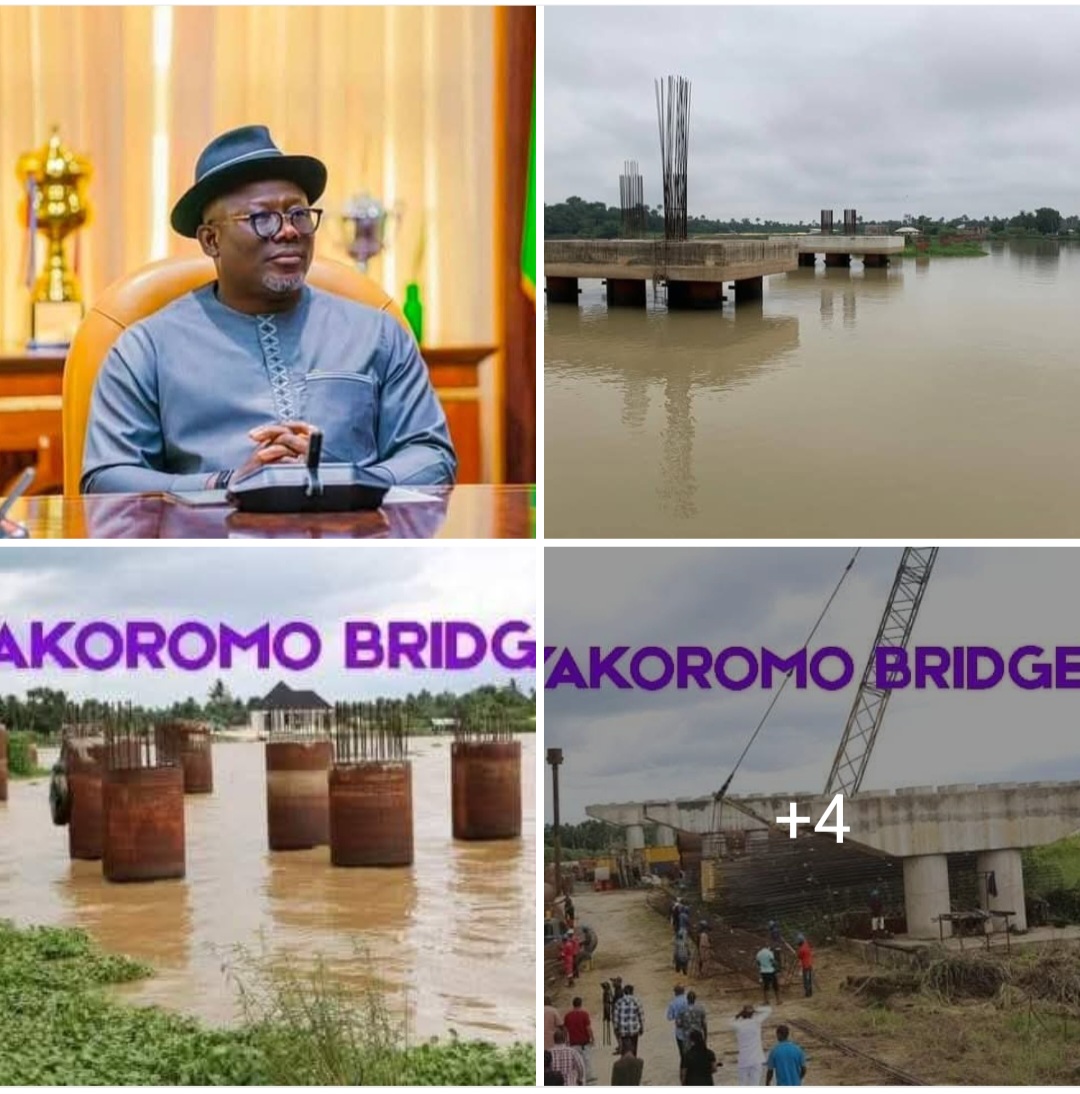
* As Group Gears Up to Endorse Governor Sheriff Oborevwori for 2027
By: Divine Perezide
Ahead of the 2027 general elections gradually inches closer, the political terain have seen a lot of endorsements at various levels. In Delta, there have been reports of a planned endorsement of governor Sheriff Oborevwori as the sole candidate by a group of Delta Ijaws. This has however, triggered reactions from many stakeholders, including a prominent Ijaw leader, peace and development advocate, Comrade (Chief) Mulade Sheriff, PhD, who has declared that Ijaw votes in 2027 would be determined by projects allocated, adequately funded to completion in the 2026 budget.
The renowned human and environmental rights activist made the declaration at a press briefing after an expanded stakeholders meeting in Warri on behalf of Ijaw Ethnic Nationality in the state.
According to the Ibe Sorimowei of the ancient Gbaramatu Kingdom, the adequate inclusion and funding of projects in the riverine areas will serve as critical consideration for political support, and riverine communities predominantly occupied by the Ijaws and Itsekiri ethnic nationalities.
While he commended the infrastructural development stride by governor Oborevwori in the upland areas, Mulade however lamented the absence of such infrastructural revolution in the riverine areas of the state despite the population density and huge revenue contributions to the state as host to multinational oil and gas companies.
He said, “I want to sincerely appreciate His Excellency, Rt. Hon. Sheriff Oborevwori, for the infrastructural development, which I described as infrastructural revolution in the state, particularly in the upland, and your proposed commissioning of the reconstructed Odimodi-Ogulagha road earlier constructed by SPDC in the 1980’s for their operational convenience and community residents.
“It is imperative to state that some Ijaw communities such as Ogulagha, Torugbene, Oporoza, Akugbene, Ojobo etc. are more densely populated than some local government headquarters in the upland, but they are deliberately deprived of development because of the so-called claim of terrain challenges.
“These communities host multinational oil and gas companies contributing immensely to the state revenue, but without any significant projects,” he lamented.
The Ibe-Sorimowei who reminded the governor of how the Ijaws adopted, supported and stood by him all through the election season, also gave the assurance of massive Ijaw votes come 2027, but one that must be backed by the governor’s commitment to development through massive projects inclusion for the area.
“We (the Ijaws) have created a conducive atmosphere to boost oil and gas production, making Delta the richest state; support security, douse restiveness and support economic stability. It is time for the governor to reciprocate through the 2026 budget with tangible legacy projects,” he asserted.
Speaking further he said, “Your Excellency, permit me to draw your attention to some expected critical projects that must be considered for the Delta Ijaw nation: the Ayakoromo bridge, Omadino-Okerenkoko-Kokodiagbene-Escravos road, Aladja-Ogbe-Ijoh Road, Ojobo-Torugbene road, among others.
“Build a first class Health Centre/General Hospital in riverine community, particularly at Ogulagha Town, to compensate the people for their huge contributions to the state revenue.
On education, he appealed that, “It is worthy of note that every ethnic group in Delta State hosts state university except the Ijaws and the Itsekiris. I want to strongly and sincerely appeal to His Excellency, Rt Hon Sheriff Oborevwori once again, to consider the upgrading of the Delta State Maritime Polytechnic, Burutu, which is a moribund polytechnic, to a campus of the Delta State University, Abraka. This will position the state to explore the blue economy opportunities. Equally too, the state government should, without delay, build a campus of Dennis Osadebe University at Koko to give sense of belonging to the Itsekiris with a special focus on agriculture for Deltans.
“The above mentioned projects constitutes significant live-wire for the Delta Ijaw, and will translate into votes come 2027. We can assure His Excellency, Rt Hon Sheriff Oborevwori, of 100 percent of the entire Ijaw votes come 2027.
“The consideration of revolutionary projects in the riverine areas in the 2026 budget will give a sense of belonging to the people for their huge contributions. Moreover, your commitment to development will write your name in gold, not just seeking their votes during elections.”
Opinion
“Tompolo: A Movement of Transformation” – Prof. Binebai,
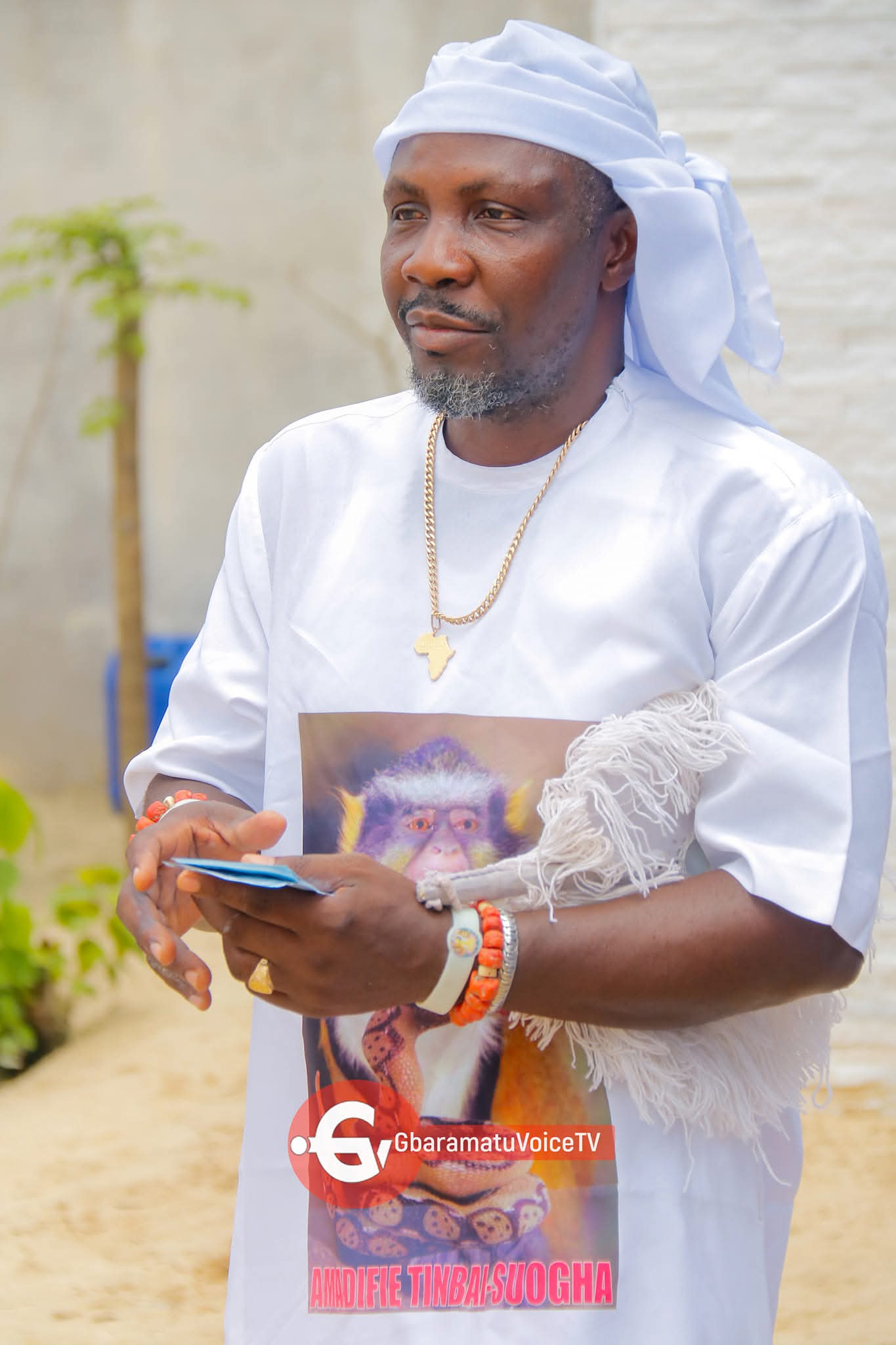
“Tompolo: A Movement of Transformation” – Prof. Binebai,
IduwiniVoice
Renowned Delta-born Professor of Professor of Drama, Dramatic Theory and Criticism, and an Auratorial god, Prof. Benedict Binebai has yet described High Chief Dr. Government Oweizide Ekpemupolo, popularly known as Tompolo as ‘A Movement of Transformation”
In his words, “Tompolo is a multifaceted entity, a veritable institution that defies categorisation, embodying a dynamic force that permeates various aspects of society. As an agency, it represents a powerful catalyst for change, driving progress and innovation in its wake. As a model, Tompolo exemplifies excellence, demonstrating a paradigm of leadership that is at once inspiring and aspirational. His influence extends far beyond the realm of politics, permeating the cultural, religious, and spiritual spheres, where he fosters a sense of unity and shared purpose.
“As a movement, Tompolo is a seismic force, shaking the foundations of complacency and stagnation, and galvanising individuals to strive for a brighter future. His impact is felt across generations, as he empowers young and old alike to become agents of positive change in their communities. In the realm of politics, Tompolo’s leadership has been characterised by a commitment to justice, equality, and the empowerment of the marginalised. His vision for a more equitable society has inspired countless individuals to work towards a common goal, forging a sense of solidarity and shared humanity.
“Culturally, Tompolo has been a luminary, celebrating the rich diversity of Nigerian heritage while promoting a sense of national identity and pride. His influence has helped to preserve traditional values while embracing modernity, creating a unique blend of old and new. Spiritually, Tompolo’s message of hope and redemption has resonated with people from all walks of life, offering a sense of solace and comfort in times of uncertainty. His leadership has embodied a sense of compassion and empathy, inspiring a new generation of spiritual leaders to follow in his footsteps.
“In every sense, Tompolo is a transformative force, a shining example of what can be achieved through dedication, perseverance, and a commitment to the greater good. He is an impeccable movement because his philosophy, his love for society, his cultural activism, his religiosity and leadership grace and skill which is human centered is attracting a large followership, particularly in the Nigerian Delta, where his impact is deeply felt.”
This assertions resonates well with popular sentiments held not just across the Delta of Nigeria but far beyond. Tompolo’s increasing popularity waxes stronger on the pillars of his dedication to homemade ijaw naturality, largeheartedness, stern capability in securing critical national economic assets and the environment, and above all, a detribalized collaborative efforts with other critical stakeholders within and outside the Niger Delta for peace, stability, infrastructural development, and economic process.
(c) IduwiniVoice

